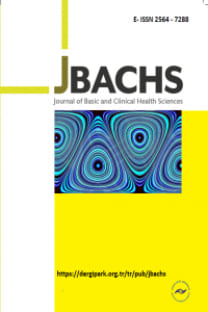Weak Ring of Family Planning Trainings: Patient Rights
___
- Inter-agency Field Manual on Reproductive Health in Humanitarian Settings. Accessed November 12, 2018 Available at: http://www.who. int/reproductivehealth/publications/ emergencies/field_manual_rh_ humanitarian_settings.pdf
- Fathalla MF, Sinding SW, Rosenfield A, Fathalla MMF. Sexual and Reproductive Health 6 Sexual and reproductive health for all: a call for action. Lancet 2006;368:2095–2100. [CrossRef]
- SRHPT (A Framework for Sexual and Reproductive Health Program in Turkey). Service Framework Report. June 2004, Ankara, Turkey. Accessed Sept 31, 2018. Available at: http://sbu.saglik.gov.tr/ Ekutuphane/kitaplar/Hizmet%20%C3%A7er%C3%A7evesi%20 dok%C3%BCman.pdf (2004)
- Turkish Law no. 2827 on Population Planning, Published in Official Gazette: 27.05.1983 Issue: 18059. Accessed March 16, 2018. Available from: http://www.saglik.gov.tr/TR/belge/1-462/rg-tarihi27051983-- rg-sayisi18059-2827-sayili-nufus-pla-.html
- Turkey Demographic and Health Survey. Accessed Nov 10, 2018: Available at: http://www.hips.hacettepe.edu.tr/tnsa2013/rapor/ TNSA_2013_ana_rapor.pdf
- WHFP (National Action Plan for Women’s Health and FP). Ministry of Health. General Directorate for Maternal and Infant Health and FP. Ankara: June, 1998.
- FP consultancy practices (17, 31). It is also an important aspect to
- Hatice K. The Influence of FP Consultancy on the Choosing of Method. The Ministry of Health. Dr Lütfi Kırdar Kartal Training and Research Hospital Family Practice. Unpublished Dissertation. 2009.
- PR Regulation Published in Official Gazette: 01.08.1998 and Issue: 23420, p:67. Accessed October 02, 2018 Available from: http://www. resmigazete.gov.tr/arsiv/23420.pdf
- Regulation on the Amendment of the PR Regulation. 08.May.2014 and Issue: 28994, Accessed Oct 10, 2018: Available at: http://www. resmigazete.gov.tr/eskiler/2014/05/20140508-3.htm
- Guvercin CH., Development of the Concept of Patient Rights in Turkey, Ankara University, Institute of Health Sciences, PhD thesis, Ankara, 2007 Accessed Nov 10, .2018. Available at: https://www. ulusaltezmerkezi.net/turkiyedeki-gelisimi-acisindan-hasta-haklari- kavrami/60/
- Patient Rights Statistics, Turkish Ministry of Health 2011. Accessed Nov 20, 2014. Available at: http://www.saglik.gov.tr/Hastahaklari/ dosya/1-94776/h/2011--hasta-haklari-istatistikleri.pdf
- Gülmez M. The Right of Human Rights Education, Public Administration Institute for Turkey and Middle East (PAITME). Ankara: Human Rights Research and Review Centre; 1996. p.7.
- Su L, Huang J, Yang W, Li H, Shen Y, Xu Y. Ethics, PR and staff attitudes in Shanghai’s psychiatric hospitals. BMC Med Ethics 2012;13:8. [CrossRef]
- Iltanen S, Leino-Kilpi H, Puukka P, Suhonen R. Knowledge about patients’ rights among professionals in public health care in Finland. Scand J Caring Sci 2012;26:436–448. [CrossRef]
- Ozdemir MH, Ergönen AT, Sönmez E, Can IO, Salacin S. The approach taken by the physicians working at educational hospitals in Izmir towards PR. Patient Educ Couns 2006;6:87–91. [CrossRef]
- Teke A, Uçar M, Demir C, Çelen Ö, Karaalp T. Evaluation of Knowledge and Attitudes of the Nurses Working in a Training Hospital about Patients’ Rights. TAF Prev Med 2007;6:259–266.
- Introduction to Reproductive Health. Republic of Turkey Ministry of Health Maternal and Child Health and FP General Directorate. Ankara: 2009; pp.2–13.
- Spencer JA, Jordan RK. Learner centred approaches in medical education. BMJ 1999;318:1280–1283. [CrossRef]
- Huezo C, Diaz S. Quality of care in FP. clients’ rights and providers’ needs. Adv Contracept 1993;9:129–139. https://doi.org/10.1007/ bf01990143
- Hoffenberg R. Training Manual on Ethical and Human Rights Standards for Health Care Professionals. London: BMJ Publish Group; 1999. J Med Ethics 2001;27:67–70. [CrossRef]
- Abdel-Tawab N, Roter D. The relevance of client-centered communication to FP settings in developing countries: Lessons from the Egyptian experience. Soc Sci Med 2002;54:1357–1368. [CrossRef]
- Newman P, Pelie E. Valuing learners’ experience and supporting further growth: educational models to help experienced adult learners in medicine. BMJ 2002;325:200–202. [CrossRef]
- Small group teaching. Multiprofessional Faculty Development. NHS London. Accessed 17 March 2018. Available at: http://www. medicine.uodiyala.edu.iq/uploads/medical%20education/Small%20 group%20 teaching.pdf
- Jaques D. Teaching Small Groups. Chapter 6. In: Cantillon P, Wood D, editors. ABC of Learning and Teaching in Medicine, 2nd ed. UK. BMJ Books, Wiley-Blackwell; 2010. pp.23–28.
- Crosby J. AMEE Medical Education Guide No 8. Learning in small groups. Med Teach 1996;18:189–202. [CrossRef]
- Dennick R, Spencer J. Teaching and learning in small groups. Section 2/9, pp 131–156. In: Dornan T, Mann K, Scherpbier A, Spencer J, editors. Medical Education, Theory and Practices. China: Elseiver Ltd.; 2011.
- Yelon SL, Ford JK, Anderson WA. Twelve tips for increasing transfer of training from faculty development programs. Med Teach 2014;36:945–950. [CrossRef]
- Steinert Y. Faculty development in the new millennium: key challenges and future directions. Med Teach 2000;22:44–50. [CrossRef]
- McCrorie P. Teaching and leading small groups. Chapter 9, pp.124– 138. In: Swanwick T, editor. Understanding Medical Education. Evidence, Theory and Practice. UK. Wiley-Blackwell; 2010. p.128.
- Contraceptive Methods. Handbook of National FP Services, Vol 2. Republic of Turkey Ministry of Health General Directorate for Maternal and Infant Health and FP. (2000). Ankara.
- Kaufman DM. Applying educational theory in practice. BMJ 2003;326:213–216. [CrossRef]
- Luke C. Learner-Centered Counseling Theory: An Innovative Perspective. Journal of Creativity in Mental Health 2017;12:305–319. [CrossRef]
- Yayın Aralığı: 3
- Başlangıç: 2016
- Yayıncı: DOKUZ EYLÜL ÜNİVERSİTESİ
Esra Akyüz ÖZKAN, Ayşe Yeşim GÖÇMEN, Yusuf KÜÇÜKBAĞRIAÇIK, Melike AKYÜZ
Optimization of Different Surface Modifications for Binding of Tumor Cells in a Microfluidic Systems
Hüseyin ÜVET, Yasemin BAŞBINAR, Hanife Ecenur MEÇO, Aslıhan KARADAĞ, Sevde ÖMEROĞLU, Gizem AYDEMİR, Muhammed Enes ORUÇ, Gizem ÇALIBAŞI KOÇAL
Çağatay BİLEN, Gökmen AKKAYA, Osman Nuri TUNCER, Yüksel ATAY
Flavonoids in Our Foods: A Short Review
Aylin ARICI, Oğuzhan ŞİMŞEK, Hülya GÜVEN
Yücel DEMİRAL, Hale ARIK TAŞYIKAN
Time Estimation and Risk Taking Behavior in Type A Personality
Gonca İNANÇ, Serhat TAŞLICA, İpek ERGÖNÜL, Adile ÖNİZ
Sibel CİRPAN, Mustafa GÜVENÇER
Yüksel ATAY, Çağatay BİLEN, Gökmen AKKAYA, Osman Nuri TUNCER
Hanife Ecenur MECO, Aslıhan KARADAG, Sevde OMEROGLU, Gizem AYDEMİR, Gizem Calibasi KOCAL, Muhammed Enes ORUC, Huseyin UVET, Yasemin BASBİNAR
